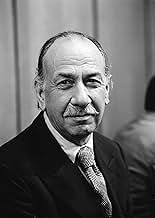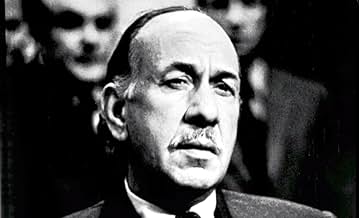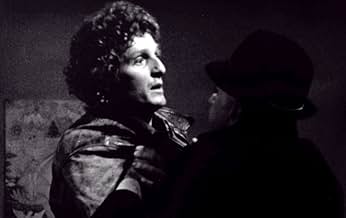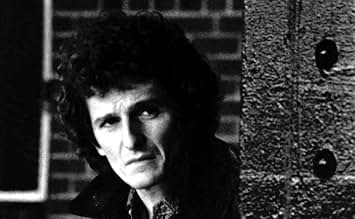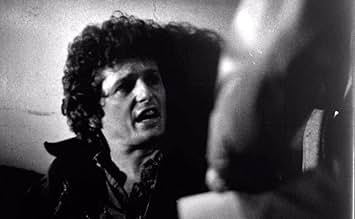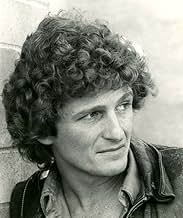A homicide detective begins to suspect that the black teenager accused of murdering two white girls is being framed by his fellow detectives.A homicide detective begins to suspect that the black teenager accused of murdering two white girls is being framed by his fellow detectives.A homicide detective begins to suspect that the black teenager accused of murdering two white girls is being framed by his fellow detectives.
- Won 2 Primetime Emmys
- 3 wins & 4 nominations total
José Ferrer
- Jake Weinhaus
- (as Jose Ferrer)
- Director
- Writers
- All cast & crew
- Production, box office & more at IMDbPro
Featured reviews
"The Marcus-Nelson Murders" is a made for TV movie set in the summer of 1963 that turned out to be the pilot for "Kojak". It's based on a real case, 'The Career Girl Murders' of Emily Hoffert and Janice Wylie, though names and a few other details have been changed. The film details the investigation as well as the misconduct by the New York Police Department, as the accused was denied his rights to an attorney and was forced into confessing for a crime he did not commit. This is a fact, as the real killer was eventually caught and later confessed to the crime...though the falsely accused man was also sent to prison for several years! The injustice of the case helped lead to the landmark Miranda Decision in 1966.
The story begins with two young women being attacked and viciously murdered by a psycho with a knife. One was also raped.
You never see who he is and the film shows the case from the standpoint of the police department...as well as from the investigator, Lieutenant Kojack (the name was changed to 'Kojak' for the TV series). Over time, he starts to wonder if the confession was infact coerced and if the young man is being victimized. Naturally, the Department is not thrilled with Kojack's actions and they just want him to just drop his inquiry...especially the prosecutor.
If you are expecting something like "Kojak", you'll probably be disappointed. Aside from Telly Savalas and a brief scene where George Savalas plays a reporter, the cast is entirely different from the TV show. This isn't good nor bad...it's just different. And, it's generally a very good film. My only quibble is a very small one...everything looks like 1973 instead of 1963...such as clothing and hairstyles.
By the way, this film came out the same year as "Serpico"...a true film about corruption within the New York Police Department.
The story begins with two young women being attacked and viciously murdered by a psycho with a knife. One was also raped.
You never see who he is and the film shows the case from the standpoint of the police department...as well as from the investigator, Lieutenant Kojack (the name was changed to 'Kojak' for the TV series). Over time, he starts to wonder if the confession was infact coerced and if the young man is being victimized. Naturally, the Department is not thrilled with Kojack's actions and they just want him to just drop his inquiry...especially the prosecutor.
If you are expecting something like "Kojak", you'll probably be disappointed. Aside from Telly Savalas and a brief scene where George Savalas plays a reporter, the cast is entirely different from the TV show. This isn't good nor bad...it's just different. And, it's generally a very good film. My only quibble is a very small one...everything looks like 1973 instead of 1963...such as clothing and hairstyles.
By the way, this film came out the same year as "Serpico"...a true film about corruption within the New York Police Department.
Who loves you, baby? Took in another TV movie with the excellent The Marcus-Nelson Murders (1973). Based on the true story of the murder of two girls in NYC and the law's attempt to railroad an innocent suspect, it also serves as the debut on Lt. Theo Kojak, a character that would go on to become an iconic TV detective. Creator-writer Abby Mann (Judgment at Nuremberg) sticks close to the 1963 Wylie-Hoffert murders and the course of events unfold with infuriating intensity. Telly Savalas is unusually subdued as Kojak, perhaps still full from chewing the scenery in Horror Express (1972). Director Joseph Sargent does a fantastic job of unpacking the complex story, even doing the opening murders in POV fashion and including some Rashomon-esque flashbacks as different stories are given for the interrogation. There is a stellar supporting cast including Allen Garfield as a prosecutor; Jose Ferrer as a defense attorney; Gene Woodbury as the accused; Marjoe Gortner as a junkie; Roger Robinson as a drug dealer; Lorraine Gary as Kojak's ex; and Ned Beatty, William Watson and Val Bisoglio as the detectives who illicit the false confession. It ends on a bleak note, but proves to be a perfect launch for the burned out detective who would soon be a household name. The saddest indictment here is that this is almost 50 years old and we're still dealing with the same issues. At least Harlem no longer looks like a bombed out war zone.
This is amazing. Kojak is more low-key here than in the series. His voiceover, especially at the end, is excellent. It's got a semi-documentary tone, thanks to the narration, comparing favorably with The Naked City. The collection of actors is good too --Jose Ferrer, Ned Beatty, Marjoe Gortner, Bruce Kirby, Allen Garfield, etc. This is a little-remembered gem, like so many forgotten pilots for successful TV shows.
Effectively the pilot for the long running TV detective series 'Kojak", this TV movie is actually far more than that, being a dramatisation (with names changed) of an important case in American legal history, in establishing the rights of a defendant to have their legal rights read to them before answering questions relating to the offence.
Not that it helped the young unemployed black victim here, subject to a monstrous miscarriage of justice which sees him charged with three murders and an attempted rape he patently didn't do, who ended up serving time despite the efforts of in particular Kojak (a composite of the actual officers who bravely stood up for the accused) and an experienced defence attorney played by Jose Ferrer after the original court appointee (played by Robert Walden, later Joe Rossi in "Lou Grant") palpably fails him.
The direction eschews showiness and documents with fly-on-the-wall realism, the seamy methods of a so-called respected police force to pin a crime on the first donkey who comes along.
Fans of the TV series will be surprised to see none of the excellent supporting cast which made the show such a success in the 70's, like Dan Frazer and Kevin Dobson, although Telly's brother George, later the hang-dog Stavros gets a bit part as a newspaper reporter. Kojak himself isn't the finished article either as we see him act in ways he never would later on, such as violently losing his temper with a suspect, getting up close and personal with a past lover and even just working as a lone wolf much of the time. Savalas himself is excellent, already displaying the intensity of his character in his fine Italian clothes, although at this stage in his development catch-phrase and lollipop-less.
I read up on the "Career Girls" murders case which begot this drama and commend the makers for staying true to the story and bringing to light an unacceptable weakness in US justice. The fact that it led to a TV series as good as any to ever come of American television was just a bonus, albeit a very good one.
Not that it helped the young unemployed black victim here, subject to a monstrous miscarriage of justice which sees him charged with three murders and an attempted rape he patently didn't do, who ended up serving time despite the efforts of in particular Kojak (a composite of the actual officers who bravely stood up for the accused) and an experienced defence attorney played by Jose Ferrer after the original court appointee (played by Robert Walden, later Joe Rossi in "Lou Grant") palpably fails him.
The direction eschews showiness and documents with fly-on-the-wall realism, the seamy methods of a so-called respected police force to pin a crime on the first donkey who comes along.
Fans of the TV series will be surprised to see none of the excellent supporting cast which made the show such a success in the 70's, like Dan Frazer and Kevin Dobson, although Telly's brother George, later the hang-dog Stavros gets a bit part as a newspaper reporter. Kojak himself isn't the finished article either as we see him act in ways he never would later on, such as violently losing his temper with a suspect, getting up close and personal with a past lover and even just working as a lone wolf much of the time. Savalas himself is excellent, already displaying the intensity of his character in his fine Italian clothes, although at this stage in his development catch-phrase and lollipop-less.
I read up on the "Career Girls" murders case which begot this drama and commend the makers for staying true to the story and bringing to light an unacceptable weakness in US justice. The fact that it led to a TV series as good as any to ever come of American television was just a bonus, albeit a very good one.
I agree with the other comment on this-I feel this is an excellent film and, when i voted for this film I noticed that many of the high votes were by people roughly the same age as me (18) who, like me, probably don't remember when this was originally shown- I feel this speaks volumes about how relevant and engaging this film remains after all these years... and don't get me wrong - I have hardly ever seen Kojak but this film as it stands on its own makes sense and is very good. I wont spoil the film but I'll just say that I also like how the film doesn't really have a definite answer and leaves the viewer to agree or disagree with the ending. I'd recommend buying this if you can as It's a good price these days but still a great film.
Did you know
- TriviaThe film is based on an actual case known as the "Career Girl" murders that happened on 28 August 1963. It was the date on which Martin Luther King delivered his "I Have A Dream" speech, as mentioned in the film.
- GoofsWhen Lt. Theo Kojack drives to Lewis Humes's party, a camera shot inside his Ford Torino shows the car has a plastic, sport side-view mirror on the driver's door. When he arrives and parks to proceed to the party, the Torino now has a metal, square, chrome, side-view mirror on the driver's door.
- Quotes
Jake Weinhaus: That's a nice woman, Saul. She managed to say goodbye even though I told her I couldn't save her son.
- ConnectionsFeatured in The 25th Annual Primetime Emmy Awards (1973)
Details
- Release date
- Country of origin
- Language
- Also known as
- Der Mordfall Marcus-Nelson
- Filming locations
- St Johns Pl and East New York Avenue, Brooklyn, New York City, New York, USA(Patrolman Stabile first finds Lewis Humes - north corner - then phones from police callbox - east corner of East New York Avenue and Strauss St.)
- Production companies
- See more company credits at IMDbPro
- Runtime
- 2h 5m(125 min)
- Sound mix
- Aspect ratio
- 1.33 : 1
Contribute to this page
Suggest an edit or add missing content

